If you are looking to add a service dog to your family, your first step is to fully understand the requirements for the dog. This knowledge can help guide your decisions as you find the right trainer, breed, and tasks perfect for your individual needs.
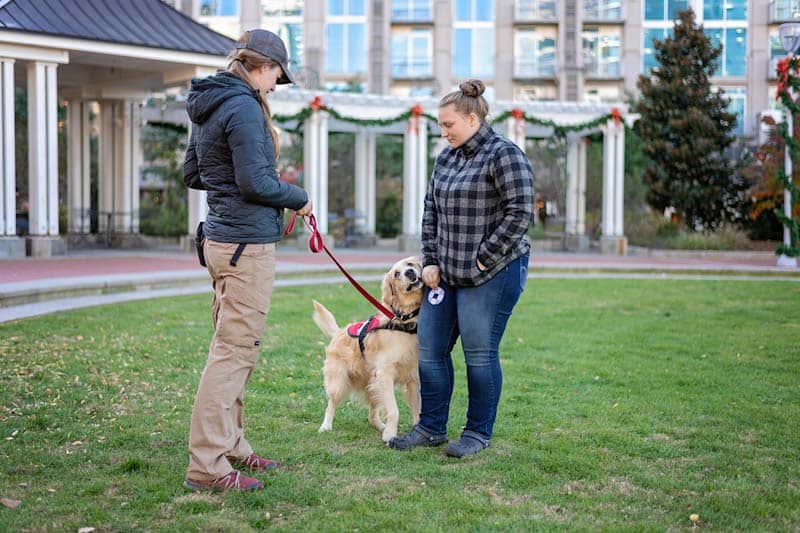
Service Dogs must be trained to perform tasks
The Americans with Disabilities Act, under US Federal Law, states, “Service dogs must be individually trained to do work or perform tasks for people with disabilities.” This means that, in order to lawfully be considered a service dog, the dog must be trained specific behaviors and commands that assist with the individual’s disability.
There are such a wide variety of people and disabilities and the tasks that a service dog can assist with are just as numerous. Some tasks include:
- picking up dropped items for someone in a wheelchair
- alerting a deaf owner to the sound of a smoke alarm
- pawing at someone to break the cycle of anxiety leading to a panic attack
The list of tasks could possibly go on forever, but what is important to understand about this requirement is that the dog must be trained to do something that helps mitigate the specific disability of the owner.
If the presence of a dog helps alleviate anxiety or even prevent panic attacks, it is considered an emotional support dog and does not share the same rights as a service dog. Emotional support dogs assist their owners with disabilities by providing comfort and companionship. If the dog is not trained specific tasks, it is not lawfully considered a service dog.
Appropriate temperament and tolerance for service work
Though all dogs obviously have their own beautiful personalities, not all personalities are acceptable for service work. Extensive temperament and tolerance testing is critical to ensure the service dog candidate will work safely around other people, animals, and more. Service dogs must be tolerant of human interaction, showing absolutely no signs of aggression when approached or touched by strangers. Though some may argue that the general public should not be interacting with service dogs in the first place, the reality of the situation is that an animal is being taken into public areas, sharing the same space as other people who may not be aware of service dog etiquette. Service dog handlers are responsible for the behavior of their service dog, which means the team needs to be prepared for a variety of situations. A young child may reach out and grab the dog’s tail without the parent even having a chance to stop them. In addition, accidents happen in daily life. Someone may stumble and bump into the dog by accident. These are all things that the service dog team needs to be mindful of and it starts with temperament testing before training and ensuring the dog has a high tolerance for interaction.
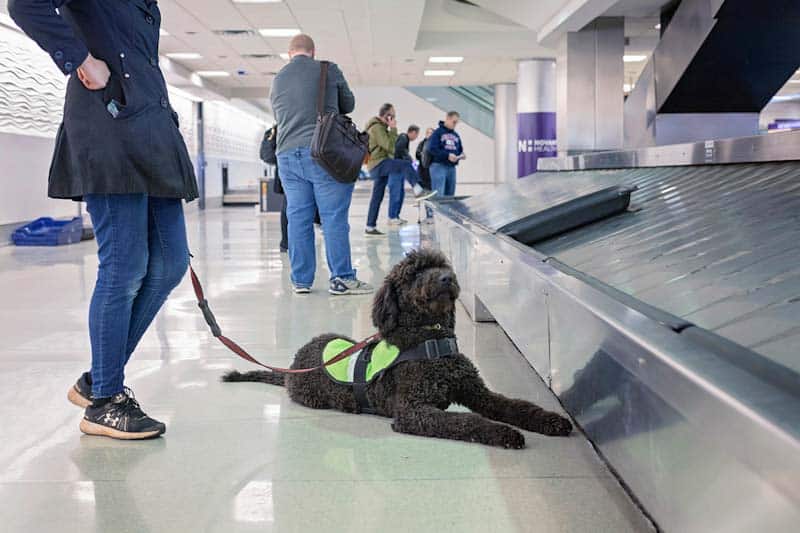
Service Dogs must be under control
In public areas, service dogs need to remain under the control of the handler at all times. The term “under control” could mean a variety of different things so it is important to understand exactly what the ADA law means by this. Service dogs are required to be harnessed, leashed, or tethered. Though uncommon, there are two exceptions to this rule:
- Leashes, tethers, or harnesses which interfere with the service dog’s tasks.
- The owner’s disability prevents the use of leashes, tethers, or harnesses.
In the case of an exception, the owner must use voice, signal, or other effective means to maintain control of their service dog.
Environmentally stable and well-socialized
Environmental stability is the foundation of a functional service dog and the most intensive area of service dog training. If a dog cannot complete tasks and listen to commands in public areas, it cannot serve as a working service dog with public access. To be environmentally stable means that the dog is not fearful in new, loud, or crowded environments. It is not overly distracted by things in the environment and it is not sent into a panic when something startling happens.
Service Dogs need to be housetrained
It may sound obvious but it’s important to remember that service dogs must be housetrained. That means no urinating, defecating, or marking in public areas that do not allow dogs. If a dog marks in a clothing store, the store’s employees can ask that the dog be removed from the store. The owner is responsible for their service dog and making sure the dog is potty trained is a high priority on the requirements of a service dog.
Good overall health and cleanliness
For important health and safety reasons, service dogs must be kept current on required vaccinations and in good general health. This is for the dog’s own safety and others around it. Additionally, the service dog needs to be clean and free of parasites such as fleas and ticks. If it is a breed that requires brushing or grooming, this needs to be maintained so there are no mats or excessive shedding. Though giving a bath everyday is definitely not necessary, consistent grooming is essential for promoting good overall health and cleanliness.
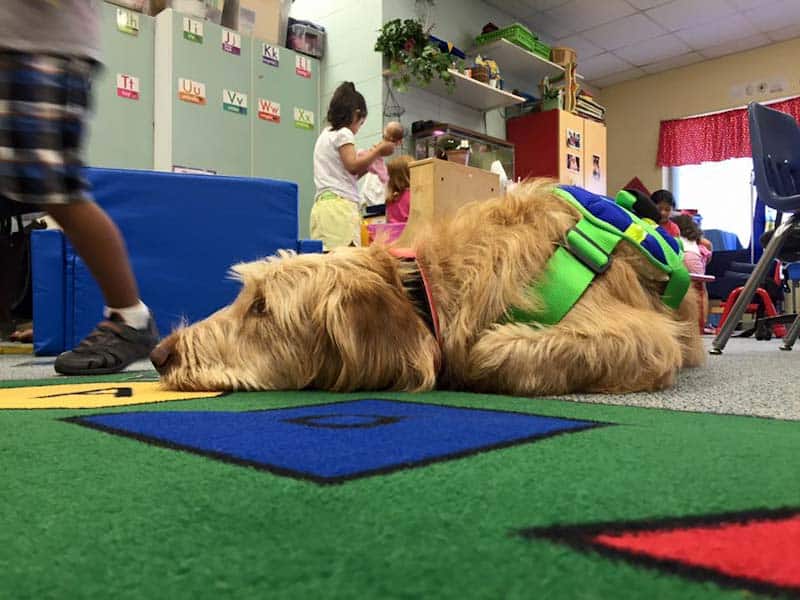
Service Dogs cannot be disruptive
The presence of a service dog must not alter the nature of a program. In most cases, this will not happen however if a service dog is being disruptive, it is possible that it may need to be removed from the premises. Unless the service dog is specifically trained to bark in certain circumstances, such as while alerting to a seizure, excessive and repetitive barking should not be allowed, especially in lecture halls, theaters, libraries, or other quiet places. This type of behavior is considered unruly.
Service Dog Certification is NOT a requirement
One thing that is not required of a service dog is certification. There is no legal certification process for service dogs, confirmed in writing under the ADA. The ADA states, “There are individuals and organizations that sell service animal certification or registration documents online. These documents do not convey any rights under the ADA and the Department of Justice does not recognize them as proof that the dog is a service animal.” Some states or local municipalities have a voluntary registry however the ADA clearly affirms, “Mandatory registration of service animals is not permissible under the ADA.”
Though service dogs can be a variety of breeds trained for an abundance of different needs, they must meet these requirements in order to be considered legitimate working service dogs with public access rights. It is important to adhere to these requirements as they are in place for very good reasons, including the safety of the handler, the dog, and the general public. If you have any questions about service dogs and the important work they do, please contact us!
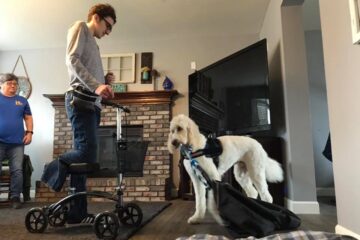
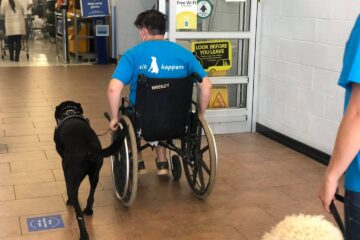
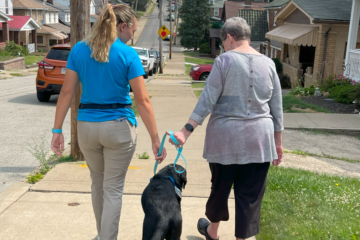
0 Comments